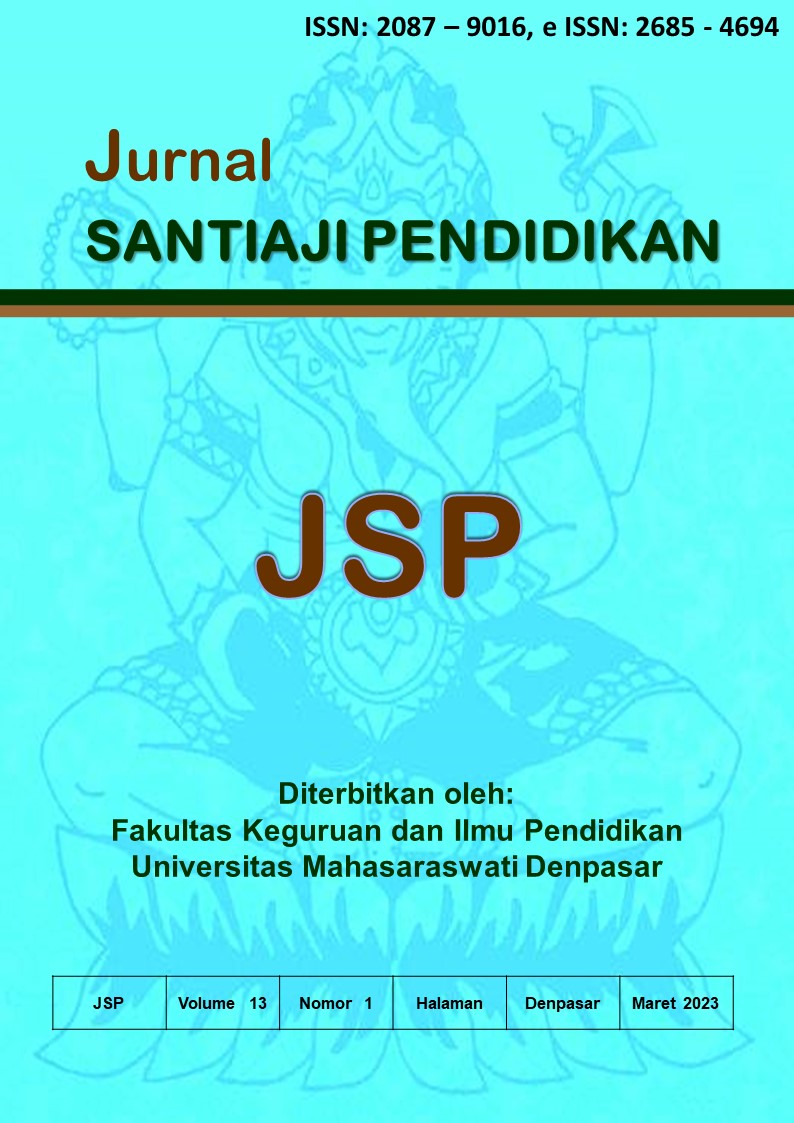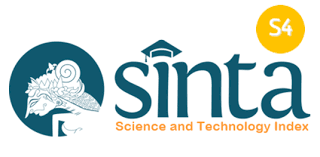TRI HITA KARANA IN EDUCATION CONTEXT: A LITERATURE REVIEW
DOI:
https://doi.org/10.36733/jsp.v13i1.6024Keywords:
education, EFL, Tri Hita KaranaAbstract
This article aims to describe the importance of Tri Hita Karana (henceforth, THK) in the education context based on previous studies. This issue is important to be researched since there is a trend of considering THK for the betterment of education. An online-based literature review was used to get the primary data. The data are taken from free downloadable articles in scientific journals that focus on THK and its values in the education context. Google Scholar and Connected Papers were used as the search engines. The articles were limited from 2018-2022 and searched with the keywords Tri Hita Karana, value, learning material, and education. In this study, the researcher defined the term THK, explained the values of THK in the education context, reviewed previous studies on the educational values of THK, and provided recommendations for the better multidisciplinary integration of THK in the education context, especially in English as a Foreign Language (EFL). The literature review indicated that, in the education context, THK is used as an indicator to be used for building character education and integrating it with classroom practice.
Downloads
References
Adnyana, I. B. A., & Sadia, I. K. (2018). Tri hita karana values in teaching and learning of Indonesian language for foreign students. SOSHUM: Jurnal Sosial Dan Humaniora, 8(2), 103–112. https://doi.org/10.31940/soshum.v8i2.983
Agboola, A., & Chen, K. (2012). Bring character education into classroom. European Journal of Educational Research, 1(2), 163–170. https://doi.org/10.12973/eu-jer.1.2.163
Atmadja, N. B. (2017). The meaning of penyelaman for Hindus and Moslems in Bali, Indonesia. International Journal of Multidisciplinary Educational Research, 6(8(3)), 103–120. https://doi.org/10.1021/bi00646a017
Dewi, N. P. S. R., Adnyana, P. B., & Citrawathi, D. M. (2020). The Validity of tri hita karana (THK) oriented blended learning tools to improve student’s critical thinking ability. Journal of Physics: Conference Series, 1503(1), 012052. https://doi.org/10.1088/1742-6596/1503/1/012052
Dewi, N. P. S. R., Adnyana, P. B., Citrawathi, D. M., Riawan, I. M. O., & Wibawa, I. M. C. (2021). Improving the critical thinking skills and responsibility character of students with blended learning based on tri hita karana. Proceedings of the First International Conference on Science, Technology, Engineering and Industrial Revolution (ICSTEIR 2020). https://doi.org/10.2991/assehr.k.210312.063
Divayana, D. G. H., Ariawan, I. P. W., Adiarta, A., Parmiti, D. P., Sanjaya, D. B., Kertih, I. W., & Wibawa, S. C. (2018). Design of countenance evaluation model based on ANEKA-tri hita karana in computer learning for vocational students of information technology in Bali. Journal of Physics: Conference Series, 1108, 012003. https://doi.org/10.1088/1742-6596/1108/1/012003
Divayana, D. G. H., Sudirtha, I. G., & Gading, I. K. (2020). Application design of countenance evaluation based on tri hita karana-aneka for evaluating the students’ computer capability and students’ character. Cogent Psychology, 7(1), 1773095. https://doi.org/10.1080/23311908.2020.1773095
Farhan, L. P., & Hadisaputra, P. (2022). Responses of religions outside of Islam toward the ecological crisis: A literature review. Millah, 21(2), 411–432. https://doi.org/10.20885/millah.vol21.iss2.art4
Huang, H., & Rockwell, J. (2019). Nature and the spirit: Tri hita karana, sacred artistic practices, and musical ecology in Bali. EnviroLab Asia, 3(2), 1–27. https://doi.org/10.5642/envirolabasia.20190302.02
Ibrahim, B., Fikri, A., & Pernantah, P. S. (2020). Integration of siak songket weaving values through value clarification technique to reinforcement of the meaningful history learning. Proceedings of the International Conference On Social Studies, Globalisation And Technology (ICSSGT 2019). International Conference On Social Studies, Globalisation And Technology (ICSSGT 2019), Padang, Indonesia. https://doi.org/10.2991/assehr.k.200803.029
Jumriani, J., Mutiani, M., Putra, M. A. H., Syaharuddin, S., & Abbas, E. W. (2021). The urgency of local wisdom content in social studies learning: Literature review. The Innovation of Social Studies Journal, 2(2), 103. https://doi.org/10.20527/iis.v2i2.3076
Kim, K., Harris, C. J., & Pham, L. (2018). How character education impacts teachers. International Journal of Multidisciplinary Perspectives in Higher Education, 3(1), xx–xx. https://doi.org/10.32674/jimphe.v3i1.632
Margunayasa, I. G., Wibawa, I. M. C., Kusmariyatni, N., Agustiana, I. G. A. T., & Jayanti, L. S. S. W. (2021). The development of e-learning in the philosophy of tri hita karana concept on the natural science course in PGSD study program, FIP UNDIKSHA. Proceedings of the 2nd International Conference on Technology and Educational Science (ICTES 2020), 7. https://doi.org/10.2991/assehr.k.210407.232
Pesurnay, A. J. (2018). Local wisdom in a new paradigm: Applying system theory to the study of local culture in Indonesia. IOP Conference Series: Earth and Environmental Science, 175, 012037. https://doi.org/10.1088/1755-1315/175/1/012037
Pornpimon, C., Wallapha, A., & Prayuth, C. (2014). Strategy challenges the local wisdom applications sustainability in schools. Procedia - Social and Behavioral Sciences, 112, 626–634. https://doi.org/10.1016/j.sbspro.2014.01.1210
Pramerta, I. G. P. A. (2022). Scaffolding for a meaningful learning: Integrating extensive reading and tri hita karana values. In Proceedings 5th International Conference of Sustainable Development (ICSD) 2021 (pp. 269-275). Retrieved from https://e-journal.unmas.ac.id/index.php/icsd/article/view/5239/3953
Sedana, K. P., Yudana, I. M., Suarni, N. K., & Nitiasih, P. K. (2022). Integrating tri hita karana in character education. Journal for Educators, Teachers and Trainers, 13(3), 8. https://doi.org/10.47750/jett.2022.13.03.010
Sukarma, I. G., Nitiasih, P. K., & Budasi, I. G. (2018). Integrating tri hita karana values in teaching reading: Students’ and teachers’ opinions. SHS Web of Conferences, 42, 00089. https://doi.org/10.1051/shsconf/20184200089
Sukendar, A., Usman, H., & Jabar, C. S. A. (2019). Teaching-loving-caring (Asah-Asih-Asuh) and semi-military education on character education management. Jurnal Cakrawala Pendidikan, 38(2), 292–304. https://doi.org/10.21831/cp.v38i2.24452
Sumardjoko, B. (2018). Model of civic education learning based on the local wisdom for revitalizing values of Pancasila. Jurnal Cakrawala Pendidikan, 37(2), 11. https://doi.org/10.21831/cp.v37i2.18037
Suwatra, I. I. W., Agung, A. A. G., Tegeh, I. M., & Mahadewi, L. P. P. (2021). The effect of tri hita karana oriented blended learning model on students character and learning outcomes at the faculty of education, Undiksha: Proceedings of the 2nd International Conference on Technology and Educational Science (ICTES 2020), 5. https://doi.org/10.2991/assehr.k.210407.235
Trisnawati, K., & Sukmana, A. I. W. I. Y. (2020). The role of playing model learning based on tri hita karana improve Indonesian language learning outcomes. Journal of Education Technology, 4(3), 302. https://doi.org/10.23887/jet.v4i3.27088
Wardhani, N. K. S. K. (2020). Developing of Hindu religious education learning model based on character education in SMA negeri 1 Pekutatan. Vidyottama Sanatana: International Journal of Hindu Science and Religious Studies, 4(1), 132. https://doi.org/10.25078/ijhsrs.v4i1.1426
Winaya, I. M. A. (2021). Developing tri hita karana based student worksheet to improve primary school students’ critical thinking during learning from home. Media Komunikasi FPIPS, 20(1), 33. https://doi.org/10.23887/mkfis.v20i1.33516
Zahra, N. Q., & Kuswanto, K. (2021). Membangun karakter sejak anak usia dini melalui penanaman nilai-nilai agama. Educatio, 16(1), 50–57. https://doi.org/10.29408/edc.v16i1.3479
Downloads
Published
Issue
Section
License
Copyright (c) 2023 FKIP Unmas Denpasar

This work is licensed under a Creative Commons Attribution 4.0 International License.











